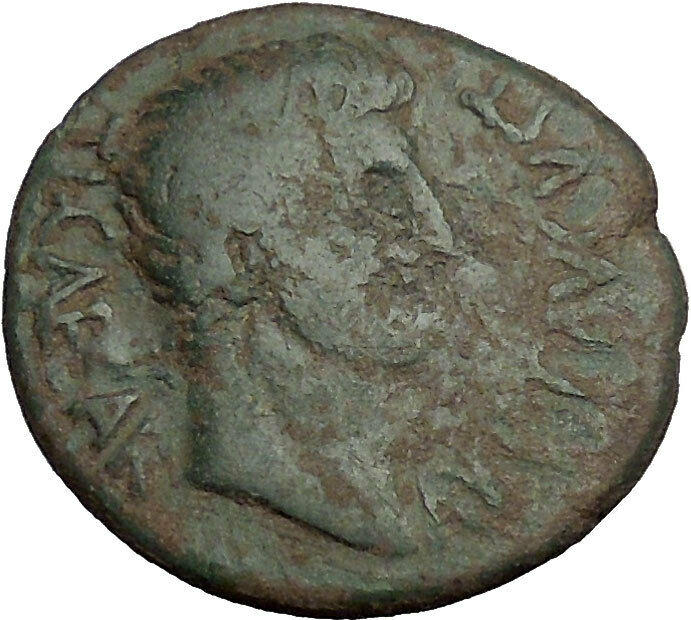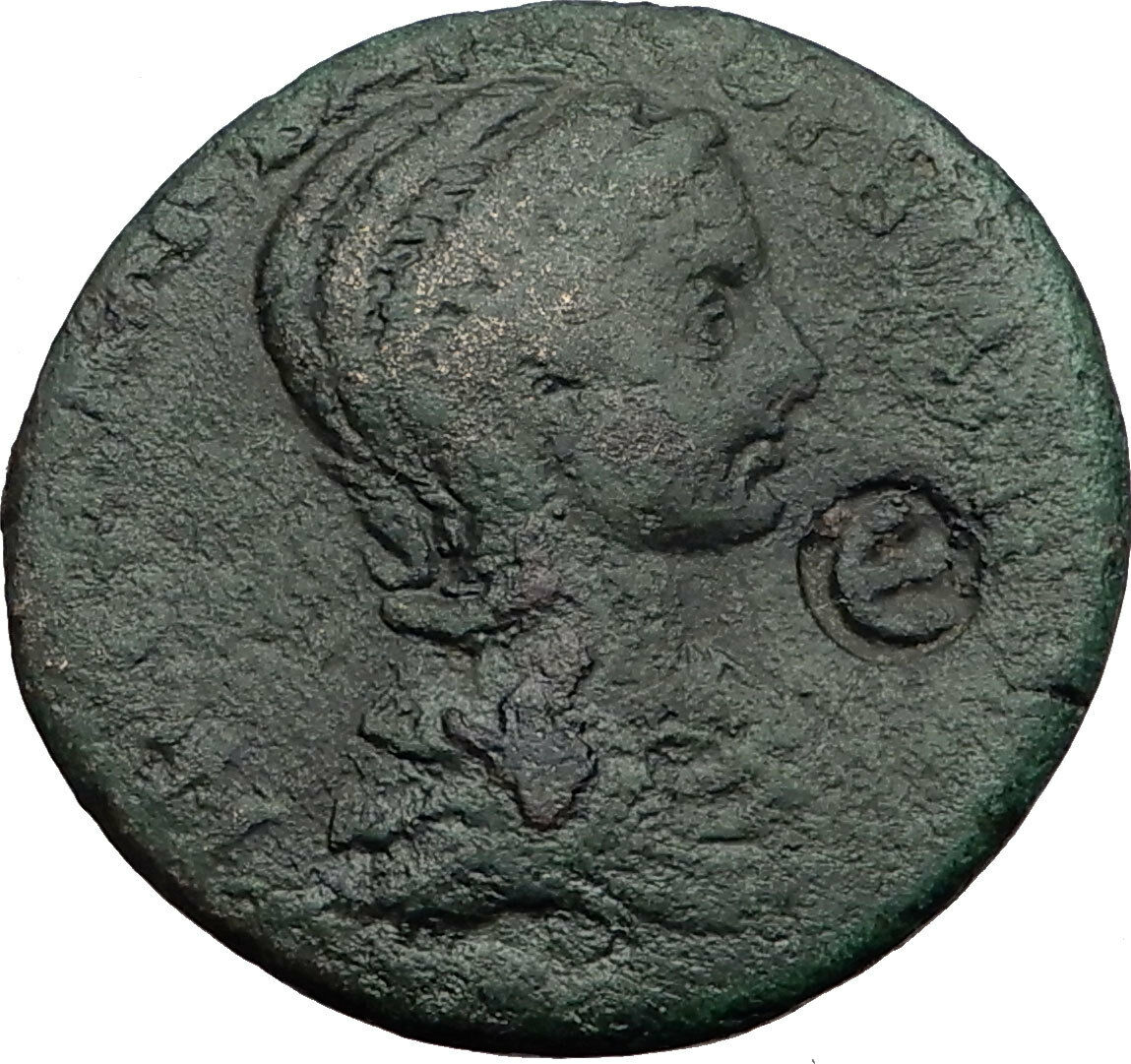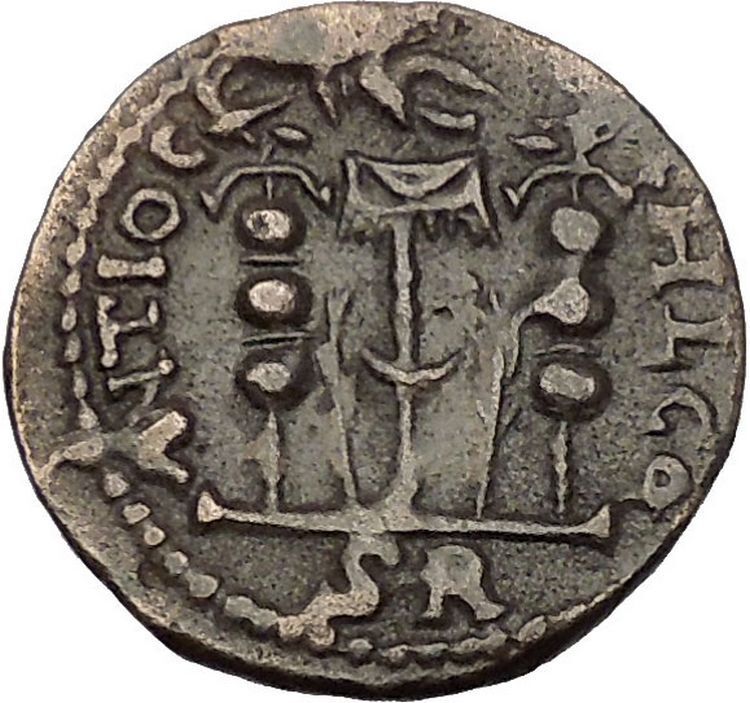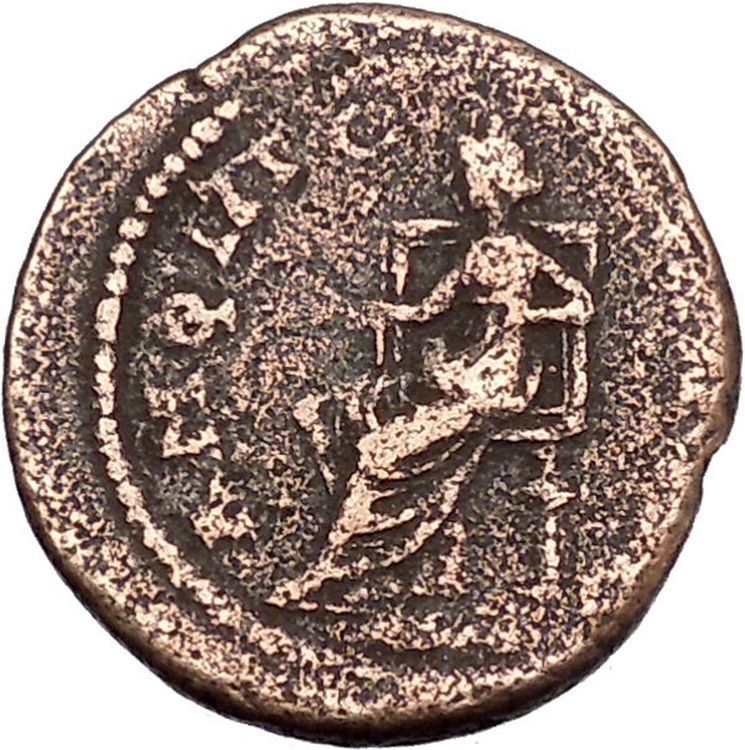|
Philip
I ‘the Arab’ –
Roman Emperor: 244-249 A.D. –
Bronze Medallion 36mm (16.96 grams) of
Tarsus in
Cilicia
Reference: SNG Levante 1151 (this coin); SNG France 1733
AVT KAI IOV ΦIΛIΠΠON ЄVT ЄVC CЄ around, Π – Π in
field, radiate, draped, cuirassed bust right.
TAPCOV THC MHTPOΠOΛEΩC AMK, Artemis standing right,
drawing arrow from quiver, Γ / B in
field to right.
You are bidding on the exact item pictured,
provided with a Certificate of Authenticity and Lifetime Guarantee of
Authenticity.
Tarsus (Greek:
Ταρσός,
Armenian
: Տարսոն, Darson) is a
historical city
in
south-central Turkey
, 20 km inland from
Mediterranean Sea
. It is part of
Adana-Mersin Metropolitan Area
, fourth largest
metropolitan area
in
Turkey
with a
population of 2.75 million. Tarsus is an administrative district in
Mersin Province
and lies in the core of
Çukurova
, a
geographical, economical and cultural region.
With a history going back over 9,000 years Tarsus has long been an important
stop for traders, a focal point of many civilisations including the
Ancient Romans
when Tarsus was capital of the province of
Cilicia
,
scene of the first meeting between
Mark
Antony
and
Cleopatra
and birthplace of
Saint Paul
.
Artemis was one of the most widely venerated of the Ancient Greek
deities. Some scholars believe that the name, and indeed the goddess herself,
was originally pre-Greek. Homer refers to her as Artemis Agrotera,
Potnia Theron
< Artemis of the wildland,
Mistress of Animals”. In the classical period of
Greek mythology
, Artemis (Greek:
(nominative)
Ἄρτεμις, (genitive)
Ἀρτέμιδος) was often
described as the daughter of
Zeus and Leto
, and the twin sister of
Apollo
. She was the Hellenic goddess of the
hunt, wild animals, wilderness, childbirth, virginity and young girls, bringing
and relieving disease in women; she often was depicted as a huntress carrying a
bow and arrows. The deer
and the
cypress
were sacred to her. In later
Hellenistic times, she even assumed the ancient role of
Eileithyia
in aiding childbirth.
Artemis later became identified with
Selene
, a
Titaness
who was a Greek moon goddess,
sometimes depicted with a crescent moon above her head. She was also identified
with the Roman goddess
Diana
, with the
Etruscan
goddess
Artume
, and with the Greek or
Carian
goddess
Hecate
.
Marcus
Julius Philippus or Philippus I Arabs (c. 204-249), known in
English
as Philip the Arab or formerly (prior to World War II) in
English as Philip the Arabian, was a
Roman
Emperor
from 244 to 249.
//
Little is known about Philip’s early life and political
career. He was born in
Shahba
, about
55 miles southeast of
Damascus
,
in the
Roman province
of
Syria
. Philip has the nickname “the Arab” because he had family who had
originated in the
Arabian peninsula
, believed to be distant descendants of the prestigious
Baleed family of Aleppo
. Philip was the son of a Julius Marinus, a local Roman citizen,
possibly of some importance. Many historians[1][2][3]
agree that he was of Arab descent who gained
Roman citizenship
through his father, a man of considerable influence. Many
citizens from the provinces took Roman names upon acquiring citizenship. This
makes tracing his Arabic blood line difficult. However, it is documented that
Rome used the
Ghassan
tribe from the
Azd of
Yemen
as vassals
to keep the neighboring northern Arabs in check.
The name of Philip’s mother is unknown, but sources refer to
a brother,
Gaius Julius Priscus
, a member of the
Praetorian guard
under
Gordian
III
(238-244). In 234, Philip married
Marcia Otacilia Severa
, daughter of a Roman Governor. They had two children:
a son named Marcus Julius Philippus Severus (Philippus
II) in 238 and according to numismatic evidence they had a daughter called
Julia Severa or Severina, whom the ancient Roman sources don’t mention.
Philip became a member of the
Pretorian Guard
during the reign of the emperor
Alexander Severus
, who was a Syrian. In ancient Rome the Pretorian Guard was
closely associated with the emperor, serving among other things as the emperor’s
bodyguard.
Political
career
In 243, during
Gordian
III
‘s campaign against
Shapur I
of
Persia, the
Praetorian prefect
Timesitheus
died under unclear circumstances. At the suggestion of his
brother Priscus, Philip became the new Praetorian prefect, with the intention
that the two brothers would control the young Emperor and rule the Roman world
as unofficial regents. Following a military defeat, Gordian III died in 244
under circumstances that are still debated. While some claim that Philip
conspired in his murder, other accounts (including one coming from the Persian
point of view) state that Gordian died in battle. Whatever the case, Philip
assumed the purple following Gordian’s death. According to Edward Gibbon:
His rise from so obscure a station to the first dignities
of the empire seems to prove that he was a bold and able leader. But his
boldness prompted him to aspire to the throne, and his abilities were
employed to supplant, not to serve, his indulgent master.
Philip was not willing to repeat the mistakes of previous
claimants, and was aware that he had to return to
Rome in order to
secure his position with the
senate
. He thus travelled west, after concluding a peace treaty with Shapur
I, and left his brother Priscus as extraordinary ruler of the Eastern provinces.
In Rome he was confirmed
Augustus
, and nominated his young son
Caesar
and heir.
Philip’s rule started with yet another
Germanic
incursion on the provinces of
Pannonia
and the Goths
invaded Moesia
(modern-day Serbia
and Bulgaria
)
in the Danube
frontier. They were finally defeated in the year 248, but the
legions
were not satisfied with the result, probably due to a low share of the plunder,
if any. Rebellion soon arose and
Tiberius
Claudius Pacatianus
was proclaimed emperor by the troops. The uprising was
crushed and Philip nominated
Gaius Messius
Quintus Decius
as governor of the province. Future events would prove this
to be a mistake. Pacatianus’ revolt was not the only threat to his rule: in the
East, Marcus Jotapianus
led another uprising in response to the oppressive rule of
Priscus
and the excessive taxation of the Eastern provinces. Two other
usurpers, Marcus Silbannacus
and
Sponsianus
,
are reported to have started rebellions without much success.
In April
A.D.
248 (April 1000
A.U.C.
), Philip had the honour of leading the celebrations of the one
thousandth birthday of Rome, which according to tradition was
founded
in 753 BC by
Romulus
. He combined the anniversary with the celebration of Rome’s alleged
tenth saeculum
.
According to contemporary accounts, the festivities were magnificent and
included spectacular games,
ludi saeculares
, and theatrical presentations throughout the city. In the
coliseum, more than 1,000 gladiators were killed along with hundreds of exotic
animals including hippos, leopards, lions, giraffes, and one rhinoceros.
The events were also celebrated in literature, with several publications,
including
Asinius Quadratus
‘s History of a Thousand Years, specially prepared
for the anniversary.
Despite the festive atmosphere, discontent in the legions was
growing. Decius
(249-251) was proclaimed Emperor by the Danubian armies in the spring of 249 and
immediately marched to Rome. Philip’s army met the usurper near modern
Verona
that summer. Decius won the battle and Philip was killed sometime in
September 249,
either in the fighting or assassinated by his own soldiers who were eager to
please the new ruler. Philip’s eleven-year-old son and heir may have been killed
with his father and Priscus disappeared without a trace.
Religious
beliefs
Further information:
Philip the Arab and Christianity
Some later traditions, first mentioned in the historian
Eusebius
in his
Ecclesiastical History
, held that Philip was the first
Christian
Roman emperor. This tradition seems to be based on reports in
Eusebius that Philip allegedly had once entered a Christian service on Easter,
after having been required by a bishop to confess his sins. Later versions
located this event in Antioch.
However, historians generally identify the later Emperor
Constantine, baptised on his deathbed, as the first Christian emperor, and
generally describe Philip’s adherence to Christianity as dubious, because
non-Christian writers do not mention the fact, and because throughout his reign,
Philip to all appearances (coinage, etc.) continued to follow the
state religion
.
Critics ascribe Eusebius’ claim as probably due to the tolerance Philip showed
towards Christians.
Saint Quirinus of Rome
was, according to a legendary account, the son of
Philip the Arab.
|









